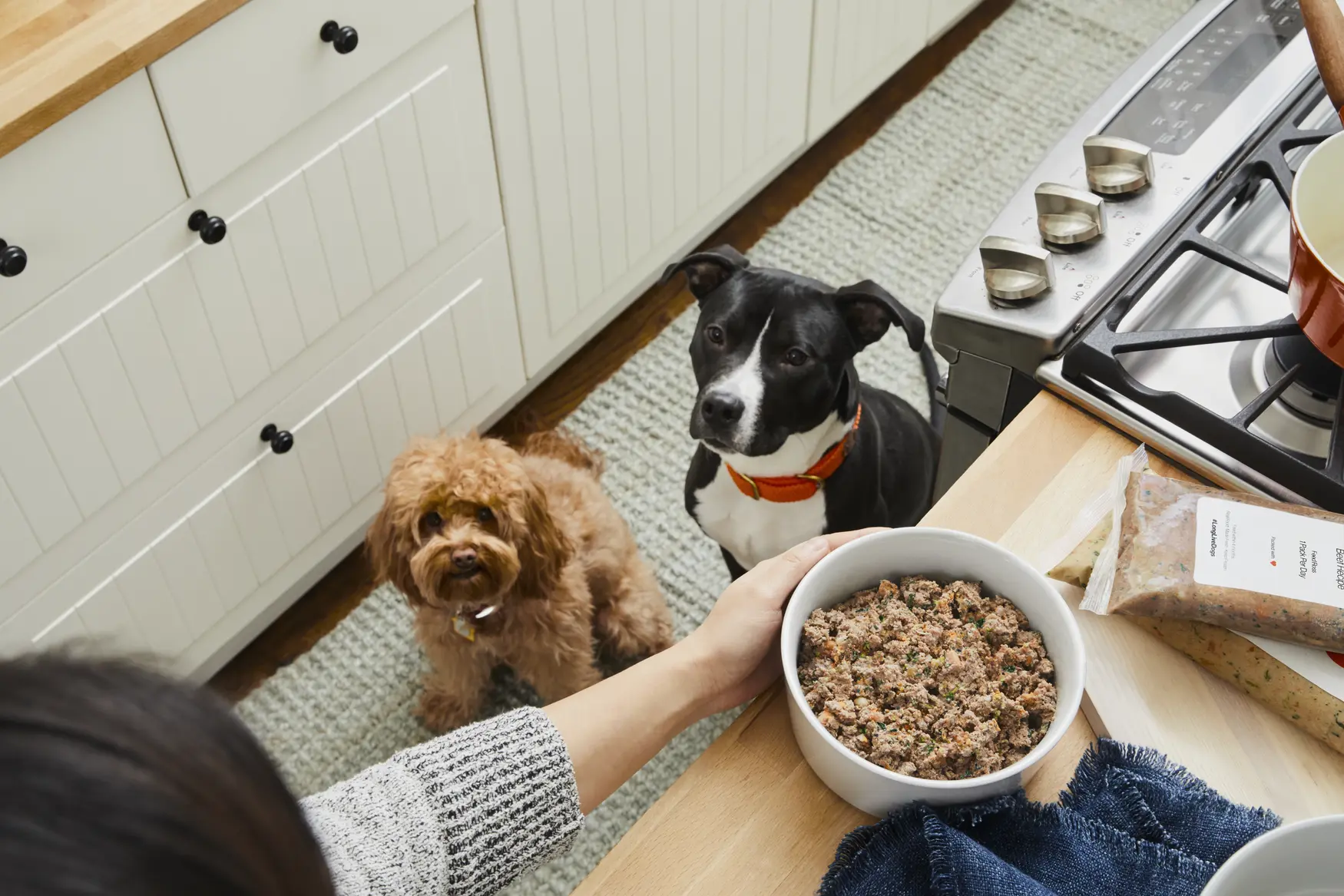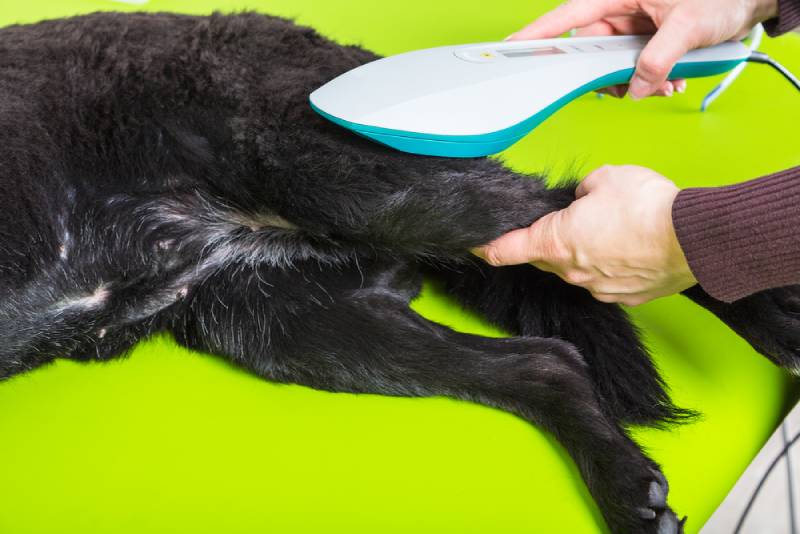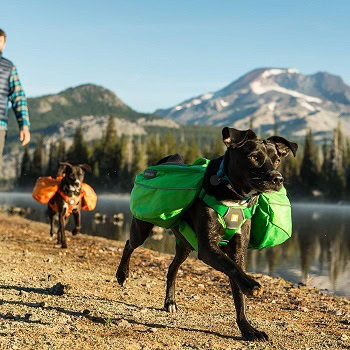Why Is My Puppy Not Pooping? 7 Reasons
Updated on

Most dogs usually spend their days playing, eating, sleeping, and pooping during their puppy stage. Since their intestines are still developing, it may sometimes seem like your puppy is constantly pooping!
The food that puppies consume throughout the day travels to their intestines quickly, causing them to poop several times throughout the day, which is entirely normal. However, if you notice that your puppy is not pooping as frequently as usual or not pooping at all, there might be an underlying problem, as this is not common in healthy puppies.
Constipation can be uncomfortable and stressful for puppies, so it’s essential to find the underlying cause of the issue.
In this article, we talk more about how often puppies should poop and go over the possible reasons that your puppy is not pooping and how to help your furry friend.
How Often Should Your Puppy Poop?
Generally speaking, puppies poop quite frequently. Dogs are extremely small during their puppy stage, since they eat many meals and their intestines and metabolism are still developing, they can quickly process food. Therefore, it’s normal for puppies to poop five to six times a day, though some dogs may have more or less frequent stools.
A puppy’s frequency of defecation drastically decreases with age. For example, 2-week-old puppies may need to go after every meal, but by 12 weeks, your dog should poop around four times a day, and by 6 months, your dog should be pooping approximately three times per day. These numbers are approximate and the type of diet your puppy eats will have an impact on their pooping frequency.
Any changes in your puppy’s pooping schedule should be gradual; if there’s a sudden increase or decrease in the number of times that your dog defecates, it’s best to reach out to your vet to discuss the changes.

The 7 Typical Reasons Your Puppy Isn’t Pooping
1. Diet
Puppies require a complete high-quality, well-balanced diet to be healthy and develop adequately. While the primary substance in their food should be protein, dogs also need fiber for their digestive tract to function properly. Otherwise, they may have constipation problems.
Puppies can become constipated and not poop due to their diet, whether due to its quality or a lack of fiber. Raw meat-based diets can make your puppy poop less and with a different texture. If you think that your puppy is constipated due to their diet, it’s best to speak with your veterinarian, who will suggest a diet change if necessary.
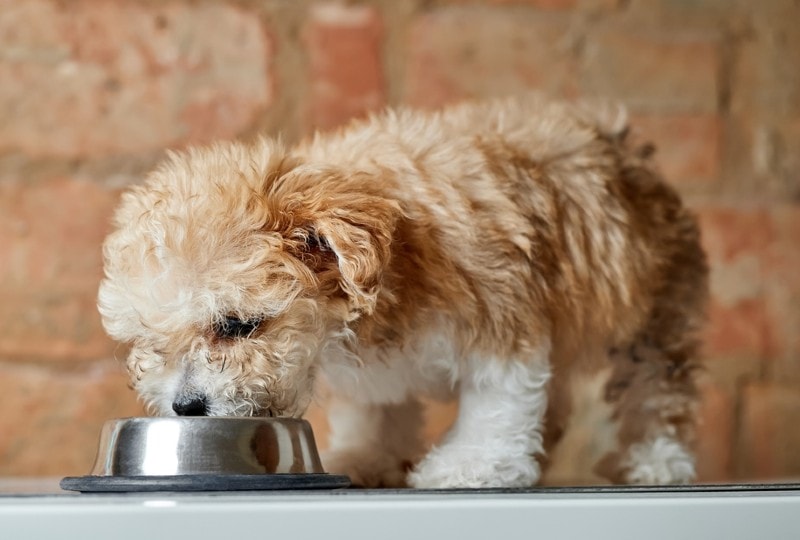
2. Intestinal Blockage
A puppy that is not popping may be suffering from intestinal blockage. Puppies are young, curious, and often clumsy, so they may accidentally consume something inedible.
For example, they may chew on toys or items around the home, which can cause intestinal blockage if ingested. Some puppies may also consume things like soil, sand, or hair, which can’t be digested and cause a blockage.
Intestinal blockages not only cause constipation in dogs, but they can also make your puppy have diarrhea. If you suspect your puppy may have swallowed a foreign object, even if they are still pooping, you should take them to their vet immediately.
Besides not pooping, other signs of intestinal blockage in puppies include:
- Vomiting
- Diarrhea
- Weakness
- Decreased or absent appetite
- Appetite decrease
- Dehydration
- Whining
- Hunching
- Abdominal pain
- Bloating
If you notice that your puppy is not pooping and exhibits any of these signs, you should immediately take your puppy for a check-up with your vet. Intestinal blockage is a serious problem that requires medical attention and may even require hospitalization.
3. Anal Gland Issues
Anal gland issues are common in puppies and adult dogs and can lead to constipation. The anal glands of dogs can become plugged due to the inflamed tissue ducts. In some cases, abscesses may form. Abscesses are often painful, red, and swollen and can release a greenish/yellow discharge if they rupture.
Although this condition is more common in adult dogs, it can also occur in puppies, which is why you should regularly check your dog’s anus. Besides not pooping, other signs of anal gland issues in your puppy may include:
- Excessive licking or biting around the anus area
- Blood coming from the rectum
- Pain and discomfort
- Foul, fishy odor
- Discomfort while sitting
- Scooting along the floor
As anal gland issues can be uncomfortable and escalate to a serious problem, schedule an immediate vet check for your puppy to get the necessary treatment options.

4. Fecal Mat (Pseudocoprostasis)
Grooming is essential for every dog; it includes everything from fur care to nail trimming and teeth brushing. While it’s the owner’s responsibility to groom their dog, most people don’t pay much attention to the area around their puppies’ back end. However, this means they can often get matted fur over their anus, especially long-haired breeds such as Shih Tzus and Yorkshire Terriers. When the matted fur mixes with feces, puppies can develop a fecal mat, also known as pseudocoprostasis. This is an extremely uncomfortable condition for your puppy where they stop pooping and develop a very unpleasant smell. A trip to the vet is essential if this situation occurs.
5. Dehydration
Every puppy requires a good diet to grow healthy and strong. Your furry friend should also have constant access to fresh drinking water. Without enough water and increased fluid losses, your dog could experience dehydration. This can be seen when puppies have several episodes of vomiting or diarrhea. Dehydration can cause constipation because the dog’s body responds to a lack of water by absorbing as much water as possible from the feces, making it hard and challenging for your puppy to pass.
Common signs of dehydration in dogs include:
- Dry nose
- Lack of skin elasticity
- Panting
- Appetite decrease
- Vomiting
- Dry gums
- Thick saliva
Dehydration is a serious problem, and besides causing constipation in your puppy, it could lead to several other health issues. Therefore, you should immediately react to any signs of dehydration in your dog and schedule a vet check-up to get the necessary treatment.
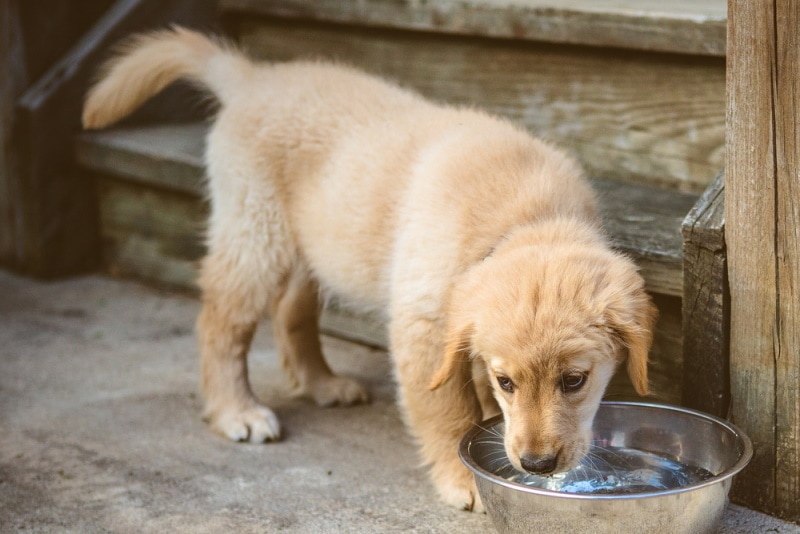
7. Stress and Sudden Changes
Puppies are young, which often means they are fearless and courageous. However, the puppy stage also involves the possibility of suffering from stress and anxiety when uncomfortable situations arise.
If a puppy had to deal with sudden home changes, they may develop anxiety, which can impact their feeding and pooping habits, resulting in constipation. You should focus on making your puppy comfortable, strengthening your bond, and lowering the incidences of stressful situations.
What Should You Do If Your Puppy Is Not Pooping Enough?
Typically, puppies poop around five to six times a day; If your puppy is pooping less often than that, they’re likely not pooping enough, and you should contact your veterinarian. They will advise you on how to help your puppy at home or will suggest bringing in the puppy for a check-up if the problem is persistent.
In Which Situations Should You Immediately Visit the Vet?
When your puppy is not pooping enough, it’s essential to speak with your veterinarian and see what’s going on. Most of the time, puppies that experience constipation can receive in-home treatment to get their bowels moving again. However, if your dog is not pooping enough due to intestinal blockage, a fecal mat, or anal gland problems, you should immediately take your puppy to the vet.
Here’s a list of other indicators that your puppy may require a vet visit due to constipation:
- Hasn’t pooped for 24 hours
- Is vomiting or retching
- Is drooling
- Is experiencing abdominal pain
- Is experiencing an appetite decrease
- Appears weak or lethargic
- Has swollen belly
- Is trying to defecate but is unable to do so
Such situations will require veterinary intervention and quick reactions, so time may be of the essence to help your pup.
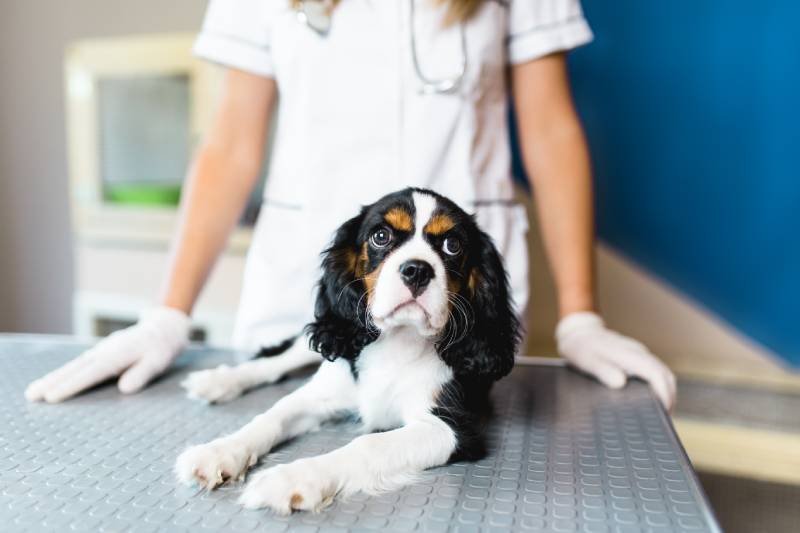
 Conclusion
Conclusion
Constipation is not that common in puppies, but it can occur for several reasons. Puppies should generally poop between five and three times per day depending on their age. If you think that your puppy is not pooping enough, start by contacting your veterinarian, and monitor your pup for other signs of constipation.
The vet will advise you on the steps to take to help your puppy, and they may ask you to bring them in for a check-up. Remember that in such situations, reacting quickly to prevent further health problems in your canine is essential.
Featured Image Credit: Jon Buscall, Shutterstock



 Conclusion
Conclusion